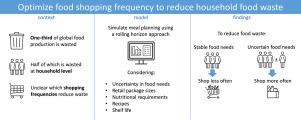不确定条件下的膳食计划:购物频率如何影响食物浪费
IF 9.6
1区 环境科学与生态学
Q1 ENVIRONMENTAL STUDIES
引用次数: 0
摘要
食物浪费是多种家庭食物管理常规的不希望的结果。为了减少这种食物浪费,干预措施通常会促进预防食物浪费或回收食物浪费的行为。当涉及到购物行为时,这些行为可能是矛盾的。防止食物浪费的策略建议一次购物多天,以受益于规划和协调食品包装,以满足几天的需求,而食物垃圾回收主张更频繁的购物旅行,以解释日常生活的不可预测性。这项研究分离了购物频率对食物浪费的影响,评估了它在不同程度上的影响,这些不确定性与谁会出席晚宴有关。在考虑营养充足性和包装大小的情况下,通过选择食谱组合,制定了一个数学膳食计划模型,以生成晚餐膳食计划和购物清单。该模型使用滚动视界方法来模拟在配料需求方面面临各种不确定性的家庭情况下的膳食计划。作为基本情况,该模型在一个四口之家的21天范围内运行。分析揭示了频繁购物的灵活性和协调食品购买的好处之间的权衡。与需求稳定的家庭相比,食物需求不确定性较高的家庭从更频繁的购物中受益,在低、中、高不确定性家庭情况下,购物频率的食物浪费总量分别为每21天0-52克、46-300克和50-900克。此外,研究结果表明,根据家里已有的食物选择食谱,在所有不确定性水平下,食物浪费可以减少到每天3克。这些见解表明,根据家庭不确定程度量身定制的购物和膳食计划策略可以大大减少食物浪费,并为有针对性的干预提供信息。本文章由计算机程序翻译,如有差异,请以英文原文为准。

Meal planning under uncertainty: How shopping frequency affects food waste
Food waste is the undesired result of multiple household food management routines. To reduce this food waste, interventions typically promote either food waste prevention or food waste recovery behaviours. These behaviours can be contradictory when it comes to shopping practices. Food waste prevention strategies suggest shopping for multiple days at once to benefit from planning and coordinate food packages with the needs of several days, whereas food waste recovery advocates for more frequent shopping trips to account for the unpredictability of everyday life. This study isolates the impact of shopping frequencies on food waste, assessing its effects across varying levels of uncertainties related to who will be present for dinner. A mathematical meal planning model is formulated to generate dinner meal plans and shopping lists by selecting combinations of recipes while considering nutritional adequacy and package sizes. The model uses a rolling horizon approach to simulate meal planning for household situations that are facing varying uncertainties in ingredient needs. As a base case, the model is run over a 21-day horizon for a household of four persons. The analysis reveals a trade-off between the flexibility of frequent shopping and the benefits of coordinating food purchases. Households with higher uncertainty in food requirements benefit from more frequent shopping compared to those with more stable needs, with total food waste across shopping frequencies ranging from 0–52 grams, 46–300 grams, and 50–900 grams per 21-day horizon for low-, medium-, and high-uncertainty household profiles, respectively. Moreover, the findings show that food waste can be minimized to 3 grams per day across all uncertainty levels by selecting recipes based on the food items already in stock at home. These insights suggest that tailored shopping and meal planning strategies based on household uncertainty levels can substantially reduce food waste and inform targeted interventions.
求助全文
通过发布文献求助,成功后即可免费获取论文全文。
去求助
来源期刊

Sustainable Production and Consumption
Environmental Science-Environmental Engineering
CiteScore
17.40
自引率
7.40%
发文量
389
审稿时长
13 days
期刊介绍:
Sustainable production and consumption refers to the production and utilization of goods and services in a way that benefits society, is economically viable, and has minimal environmental impact throughout its entire lifespan. Our journal is dedicated to publishing top-notch interdisciplinary research and practical studies in this emerging field. We take a distinctive approach by examining the interplay between technology, consumption patterns, and policy to identify sustainable solutions for both production and consumption systems.
 求助内容:
求助内容: 应助结果提醒方式:
应助结果提醒方式:


